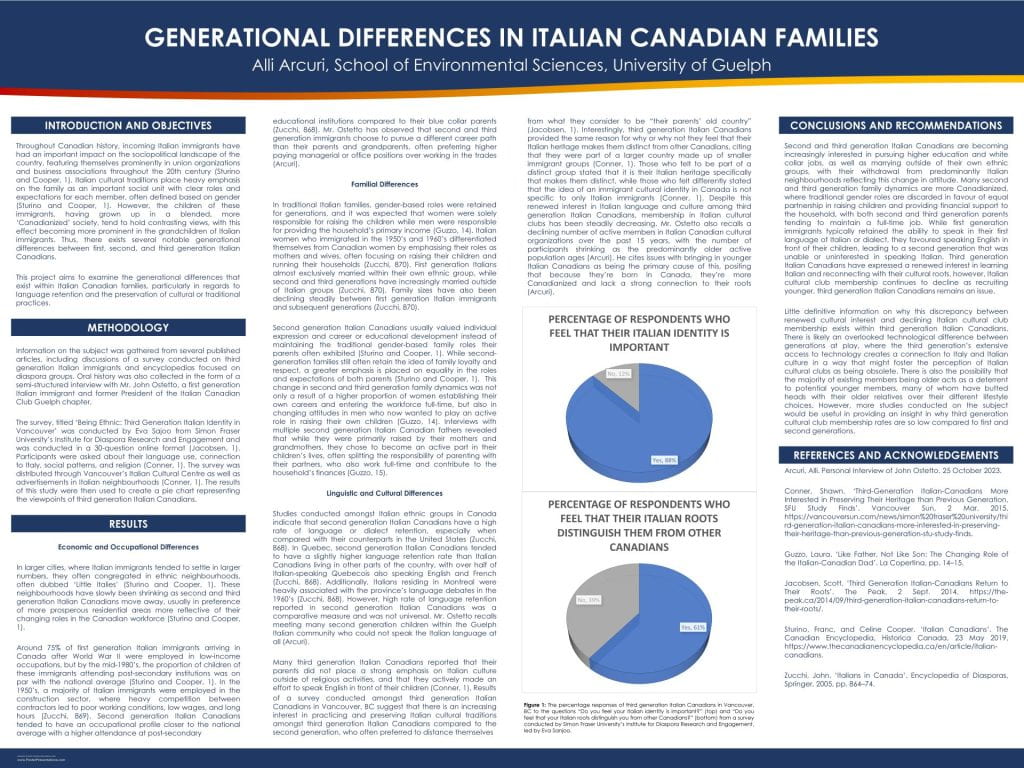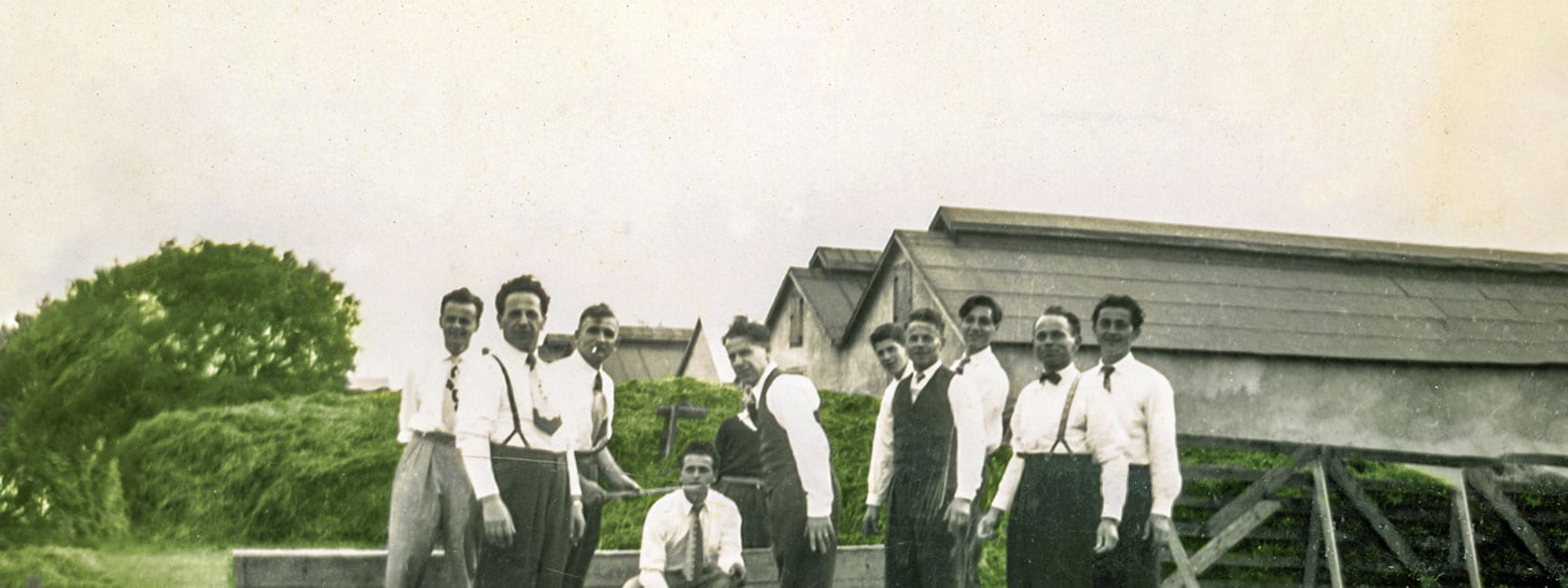Written by Alli Arcuri
Introduction
This project was carried out with the purpose of documenting and preserving the life stories and immigration experiences of Italian immigrants in Canada as part of the HUMN*3800 Italian Heritage course at the University of Guelph. By recording the first-hand experiences of Mr. Ostetto in his own words and sharing his story with the wider community, this project aims to contribute to the wealth of educational resources and recorded accounts of Italian immigration to Canada.
Oral history was collected from a consenting participant from the local Italian Canadian community, Mr. John Ostetto, via audio and video recording of an interview conducted at the participant’s home. The questions asked pertained to Mr. Ostetto’s background, reasons for immigration, arrival in Canada, difficulties related to immigration, and his life in Canada. The information from this interview was then compiled in a written summary, then used to create a report about Italian immigration experiences published on the University of Guelph WordPress page that is accessible to the community. Information about the Italian Canadian experience obtained from the interview and from published sources was used to create an academic poster, which can act as a useful educational resource on the subject.
Table of Contents
Interview
Summary of Interview
 Loading…
Loading…
Generational Differences in Italian Canadian Families

Analysis
Like many Italian immigrants, Mr. Ostetto’s journey to Canada was influenced by several common factors, including a poor economic situation in Italy, a labor shortage in North America, and the need for paid employment to support family back home. As was common at the time, Mr. Ostetto’s formal education was limited but his formative years were spent completing an apprenticeship to become a specialized machinist, a highly skilled trade that would later enable him to start his own business in Canada. The arrival of Italian immigrants has long been associated with skilled trades since the early frontier days, where the development of railways across the continent required an excess of workers who understood the intricacies of excavation work, shoring, and levelling (Harney, 7). Throughout this period of development, Italians with experience in a variety of different trades have brought various skills to other nations’ frontiers, particularly in the United States and Canada (Harney, 6). Italian immigrants often found a stereotypical niche in these trades, and though these jobs were not seen as particularly glamorous, the work involved was just as important in the development of the nation’s critical infrastructure as what was classified as a ‘more respectable’ occupation at that time (Harney, 7). Despite being looked down upon for their status, most Italian immigrants maintained a strong work ethic and a drive to provide their children with a better life on a new continent, away from the hardships of their parents’ homeland; an attitude that is very much still prevalent in many immigrants today.
Along with their contributions to the labor force, Italian immigrants also brought their cultural practices with them to the new world. Many Italian Canadian communities congregated within the same neighborhoods, often dubbed ‘Little Italies’, where they established a variety of social clubs, celebrated Catholic holidays, conducted business, and opened restaurants or cafés that displayed their unique culinary traditions (Sabourin and Lambert, 1). Italians arriving immediately after the Second World War, or during the larger wave occuring between 1961 to 1975 often found themselves settling in these pre-existing cultural enclaves (Sabourin and Lambert, 1), likely chasing a sense of familiarity in a strange new land. As Mr. Ostetto had described within his interview, maintaining one’s cultural roots and passing down these traditions to the next generation is deeply important to a lot of Italian immigrants. Many choose to speak in Italian or in their regional dialect at home with their families while also maintaining important cultural practices, such as the tradition of having dinner together as a family. The concept of maintaining a close-knit family unit is an often-recurring theme in the upbringing of children of Italian immigrants, as is the concept of immigrant parents trying to provide the best life they can for their children (DiStefano, 1).
Several Italian Canadian communities have banded together to create social and cultural clubs to help maintain a link with Italy and promote Italian culture in the wider community and the younger generations. In Guelph, Mr. Ostetto is an integral part of the Italian Canadian community, having been involved with Pio Decimo, Trevisani del Mondo, and serving as the Italian Canadian Club President between 2006 and 2010. The promotion of Italian culture within the community is incredibly important for preserving it among the younger generations of Italian Canadians who were born in Canada to immigrant parents or grandparents, allowing it to remain a relevant piece of their identity and become a part of Canadian culture as a whole.
Reflection
Having been raised by my grandparents, both of whom were born in Abruzzo, Italy, taking on the role of interviewer in this context provided me with a new perspective on my upbringing, specifically that of the parents’. Generational differences do exist between myself and my grandparents, similar to those between Mr. and Mrs. Ostetto and their children and grandchildren, so this interview allowed me to view how these differences are approached from the opposite side. There were also a lot of familiar experiences described by Mr. Ostetto, particularly in living in a household where emphasis is placed on maintaining the Italian language or dialect as well as cultural practices. This experience provided me with a better understanding of my grandparents’ perspective and some of the choices they made while I was growing up.
The biggest academic or personal development that occurred during this project was getting experience with interviewing someone I was not already familiar with. I tend to get nervous about speaking with people I don’t know very well, so participating in this project helped me further develop my communication skills in that regard.
The direction of this project changed significantly from my initial idea. I was originally planning on interviewing my grandmother and had gotten as far as obtaining an audio recording of our conversation. However, my grandmother is a very proud woman and did not want to admit her struggles when arriving in Canada, so she left a lot of information about her experiences out of the interview. There was also a bit of a language barrier, as she primarily speaks in dialect. While I understand the dialect, I did not feel comfortable translating it to English as a lot of the nuance of the language would be lost and I didn’t want to skew or misconstrue my grandmother’s words. In total, the interview recording with her lasted about three minutes, and I felt that I did not have enough information to complete this project based on what she was willing to share. As such, I reached out to my professor and was put in contact with Maria Prigione, whom I scheduled the interview with Mr. Ostetto. I was nervous about conducting this interview, both because I get anxious around people I don’t know well, but also because I was worried that Mr. Ostetto might not feel comfortable sharing his experiences with me because he also didn’t know me well. Fortunately, the interview went incredibly well. Mr. and Mrs. Ostetto were very kind and welcoming; they were also very willing to share their experiences with me. This interview ended up being nearly an hour long, and it is filled with valuable information about their stories. The experience went a lot smoother than I had expected. Overall, I am very happy with the direction this project ended up going in and I enjoyed working on it.
Bibliography
Arcuri, Alli. “Personal Interview of John Ostetto: Industry, Culture, and Immigration: The Story of John Ostetto.” 25 October 2023.
Arcuri, Alli. “Generational Differences in Italian Canadian Families.” In Italian Communities in Canada: Heritage, Cultural and Ethnographic Studies, suprv. Teresa Russo. University of Guelph: 08 December 2023, Guelph (academic poster, www.italianheritage.ca).
DiStefano, Daniela. ‘Growing up Italian. Now and Then’. Panorama Italia, 6 Feb. 2013.
Harney, Robert F. ‘Italian Immigration and the Frontiers of Western Civilization’. The Italian Immigrant Experience, Canadian Italian Historical Association, 1988, pp. 1–28.
Harney, Robert F. ‘Italian Immigration and the Frontiers of Western Civilization’. The Italian Immigrant Experience, Canadian Italian Historical Association, 1988, pp. 1–28.
Sabourin, Diane, and Maude-Emmanuelle Lambert. ‘Montreal’s Little Italy’. The Canadian Encyclopedia, Historica Canada, 14 Nov. 2012.
How to Cite this Page
MLA STYLE:
Arcuri, Alli. “Industry, Culture, and Immigration: The Story of John Ostetto.” In Italian Communities in Canada: Heritage, Cultural and Ethnographic Studies, suprv. Teresa Russo. University of Guelph, 08 December 2023, Guelph. Italian-Canadian Narratives Showcase (ICNS), Sandra Parmegiani, Kyra Bates, and Gurpreet Kaur.


